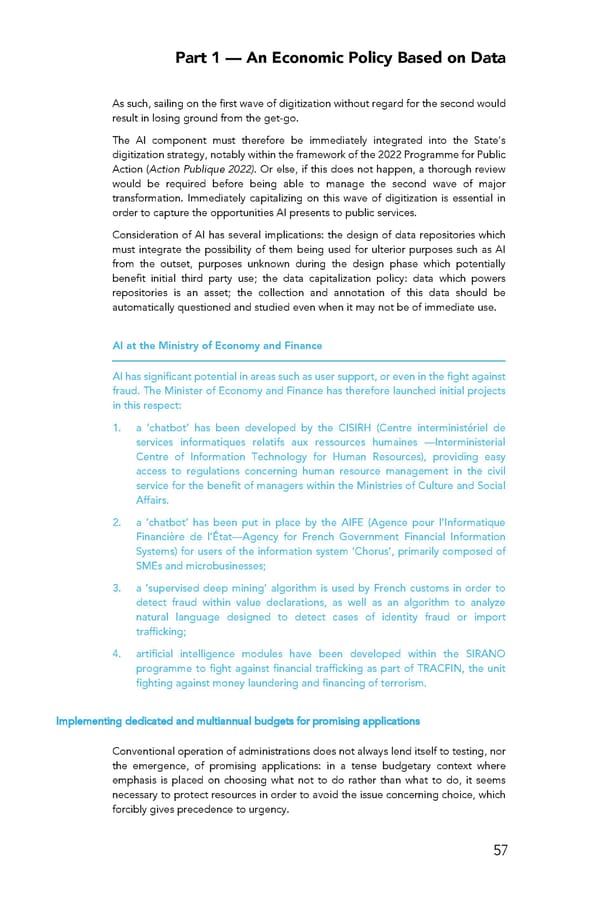Part 1 — An Economic Policy Based on Data As such, sailing on the first wave of digitization without regard for the second would result in losing ground from the get-go. The AI component must therefore be immediately integrated into the State’s digitization strategy, notably within the framework of the 2022 Programme for Public Action (Action Publique 2022). Or else, if this does not happen, a thorough review would be required before being able to manage the second wave of major transformation. Immediately capitalizing on this wave of digitization is essential in order to capture the opportunities AI presents to public services. Consideration of AI has several implications: the design of data repositories which must integrate the possibility of them being used for ulterior purposes such as AI from the outset, purposes unknown during the design phase which potentially benefit initial third party use; the data capitalization policy: data which powers repositories is an asset; the collection and annotation of this data should be automatically questioned and studied even when it may not be of immediate use. AI at the Ministry of Economy and Finance AI has significant potential in areas such as user support, or even in the fight against fraud. The Minister of Economy and Finance has therefore launched initial projects in this respect: 1. a ‘chatbot’ has been developed by the CISIRH (Centre interministériel de services informatiques relatifs aux ressources humaines —Interministerial Centre of Information Technology for Human Resources), providing easy access to regulations concerning human resource management in the civil service for the benefit of managers within the Ministries of Culture and Social Affairs. 2. a ‘chatbot’ has been put in place by the AIFE (Agence pour l’Informatique Financière de l’État—Agency for French Government Financial Information Systems) for users of the information system ‘Chorus’, primarily composed of SMEs and microbusinesses; 3. a ‘supervised deep mining’ algorithm is used by French customs in order to detect fraud within value declarations, as well as an algorithm to analyze natural language designed to detect cases of identity fraud or import trafficking; 4. artificial intelligence modules have been developed within the SIRANO programme to fight against financial trafficking as part of TRACFIN, the unit fighting against money laundering and financing of terrorism. Implementing dedicated and multiannual budgets for promising applications Conventional operation of administrations does not always lend itself to testing, nor the emergence, of promising applications: in a tense budgetary context where emphasis is placed on choosing what not to do rather than what to do, it seems necessary to protect resources in order to avoid the issue concerning choice, which forcibly gives precedence to urgency. 57
 For a Meaningful AI - Report Page 57 Page 59
For a Meaningful AI - Report Page 57 Page 59